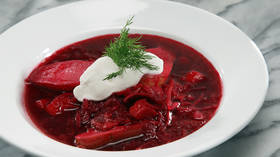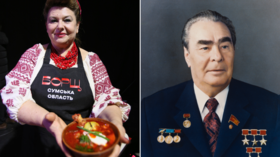Ukraine says it has won ‘battle for borscht’

Ukrainian Culture Minister Aleksandr Tkachenko announced on Friday that borsch or borscht – a popular Eastern European soup made from beetroot – has been included on the UNESCO cultural heritage list as an exclusively Ukrainian dish.
“Today, July 1, at the 5th extraordinary session of the Intergovernmental Committee for the Safeguarding of the Intangible Cultural Heritage, the element ‘Culture of Ukrainian borscht cooking’ was inscribed on UNESCO’s List of Intangible Cultural Heritage in Need of Urgent Safeguarding,” Tkachenko posted on Telegram.
He noted that “the battle for borscht was started even before the war,” and celebrated the fact that the soup was now officially recognized as Ukrainian and is under the protection of UNESCO.
Tkachenko also addressed Russian Foreign Ministry spokeswoman Maria Zakharova in his statement, writing that “no matter how much Zakharova says that ‘cook books were banned, and the recipe of the dish was kept secret and forbidden to cook’ and in general our borscht is a ‘manifestation of extremism and Nazism,’ this ‘manifestation of extremism’ is now officially Ukrainian.”
Back in April, the Foreign Ministry spokeswoman accused Kiev authorities of ordering the destruction of “objectionable literature” by burning books on religion, history, culture, and even cooking, which she compared to book burnings in Nazi Germany.
“Even books on cooking were being banned. Why? Because it was forbidden to share borscht. Forbidden! It had to belong to only one people, one nationality. Allowing it to be common, so that every city, every region and every housewife can cook it in her own way – no. They didn’t want to compromise. This is exactly what we’ve been talking about – xenophobia, Nazism and extremism in all forms,” claimed Zakharova.
Borsch is a traditional sour soup popular in many Slavic countries in Eastern Europe. It usually consists of red beetroot, which gives it its characteristic blood-red color, as well as cabbage, carrots, onions, potatoes, and often meat. However, similar to vodka, there has long been fierce debate over where it originated. Almost every nation in the region has its own variation of the soup, with many claiming to be its originators. And although the exact origin of the soup is unknown, it is believed to have been invented on the territory of Kievan Rus sometime in the 16th century.













